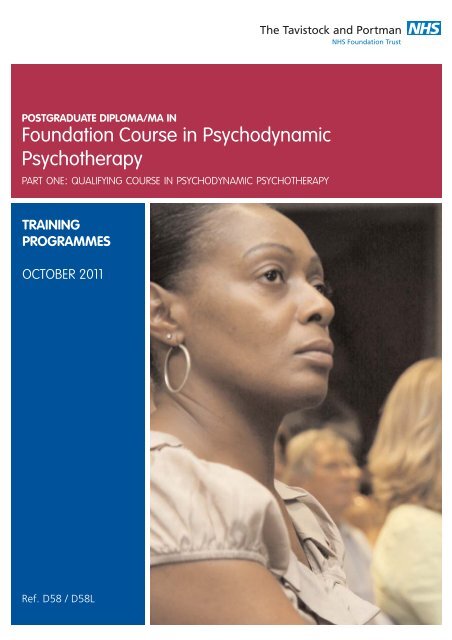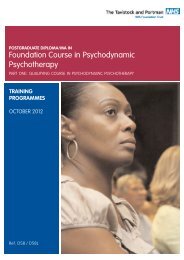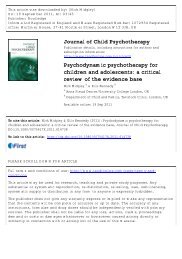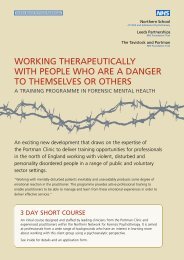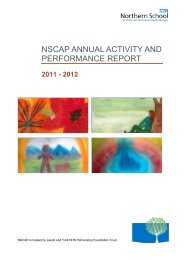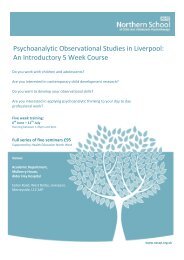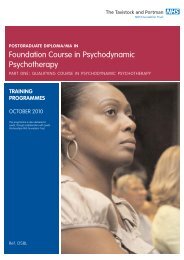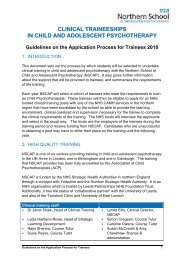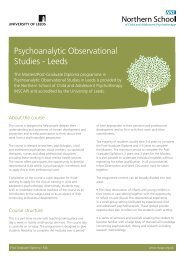D58 Course Outline.qxp - Northern School of Child and Adolescent ...
D58 Course Outline.qxp - Northern School of Child and Adolescent ...
D58 Course Outline.qxp - Northern School of Child and Adolescent ...
- No tags were found...
You also want an ePaper? Increase the reach of your titles
YUMPU automatically turns print PDFs into web optimized ePapers that Google loves.
POSTGRADUATE DIPLOMA/MA IN<br />
Foundation <strong>Course</strong> in Psychodynamic<br />
Psychotherapy<br />
PART ONE: QUALIFYING COURSE IN PSYCHODYNAMIC PSYCHOTHERAPY<br />
TRAINING<br />
PROGRAMMES<br />
OCTOBER 2011<br />
Ref. <strong>D58</strong> / <strong>D58</strong>L
This is a well-established foundation course in<br />
Psychoanalytic Psychotherapy which presents an<br />
important opportunity for pr<strong>of</strong>essionals in the<br />
health service, statutory <strong>and</strong> voluntary sectors to<br />
gain an initial training in psychoanalytic<br />
psychotherapy.<br />
It is important to apply as early as possible, as<br />
certain requirements need to be in place before<br />
you begin the course.<br />
These include being in personal psychotherapy<br />
with a BPC registered psychotherapist.<br />
We will be pleased to discuss this with you at<br />
interview <strong>and</strong> help you find a suitable vacancy.<br />
Aims<br />
The primary aim <strong>of</strong> the course is to introduce a wide<br />
variety <strong>of</strong> students to a psychoanalytic way <strong>of</strong> thinking<br />
about their clinical work. It is expected that in most<br />
instances, course participants will wish to remain working<br />
within their core pr<strong>of</strong>essions <strong>and</strong> the course will equip<br />
them with a new dimension in their capacities to reflect<br />
upon that work.<br />
This course also provides students with an opportunity to<br />
explore whether they may wish to pursue further training<br />
in psychoanalytic psychotherapy.<br />
In the contemporary NHS, many <strong>of</strong> the most vulnerable<br />
<strong>and</strong> deprived patients are from black <strong>and</strong> ethnic minority<br />
communities. Staff working in NHS <strong>and</strong> public sector<br />
settings are drawn from a wide range <strong>of</strong> racial <strong>and</strong> cultural<br />
communities. We therefore consider it essential that the<br />
inter-cultural dimension in psychotherapy is given proper<br />
attention.<br />
Inter-cultural psychotherapy is represented in the lecture<br />
programme <strong>and</strong> cultural issues will be fully considered in<br />
supervision <strong>and</strong> in the clinical seminars. In addition, there<br />
is a day-long workshop on Race <strong>and</strong> Culture each year on<br />
the 11th week <strong>of</strong> the spring term.<br />
Recognition <strong>and</strong> Qualifications<br />
Students who remain registered for the course <strong>and</strong> who<br />
successfully complete the requirements are eligible for<br />
either a Postgraduate Diploma (after two years) or an MA<br />
(after three years), awarded by the University <strong>of</strong> Essex,<br />
through the Centre for Psychoanalytic Studies.<br />
The Centre for Psychoanalytic Studies at the University <strong>of</strong><br />
Essex runs a variety <strong>of</strong> programmes, including individual<br />
courses, one year postgraduate certificates, MA schemes<br />
<strong>and</strong> doctoral programmes by research or doctoral<br />
programme. Information about the Centre for<br />
Psychoanalytic Studies is available on<br />
www.essex.ac.uk/centres/psycho<br />
The course comprises Part 1 <strong>of</strong> a qualifying course in<br />
Psychodynamic Psychotherapy accredited by the British<br />
Psychoanalytic Council. Students who successfully<br />
complete the first two years <strong>of</strong> this course are eligible to<br />
apply for Part 2 <strong>of</strong> the Qualifying <strong>Course</strong>, Intercultural<br />
Psychodynamic Psychotherapy (D59). Please note Part 2 is<br />
only accredited by the BPC.<br />
Entrance Requirements<br />
This course is <strong>of</strong>fered in partnership with the University <strong>of</strong> Essex<br />
Students have different levels <strong>of</strong> clinical experience. Some<br />
may already be familiar with psychoanalytic concepts while<br />
others are quite new to the field. Applicants should<br />
normally have a good honours degree in addition to their<br />
pr<strong>of</strong>essional qualification. Applicants not yet ready to<br />
undertake the foundation course may be eligible for an<br />
introductory programme.
A. Pr<strong>of</strong>essional<br />
Applicants are invited from the disciplines <strong>of</strong> psychology,<br />
social work <strong>and</strong> medicine, (both from general practice <strong>and</strong><br />
psychiatry), as well as those working as nurses, probation<br />
<strong>of</strong>ficers, art therapists <strong>and</strong> workers from the voluntary<br />
sector.<br />
Applicants are generally, expected to be working within a<br />
core pr<strong>of</strong>ession in the NHS or related organisations.<br />
Students should be in a position to treat at least one<br />
patient in once-weekly psychotherapy for two years.<br />
Occasionally an applicant may not have an appropriate<br />
clinical setting within which the work for this course can<br />
be conducted. Under these circumstances, the applicant is<br />
advised to discuss this situation well in advance with the<br />
course staff, so that we may be able to consider how to<br />
help find an alternative suitable setting in which to see a<br />
patient.<br />
B. Personal<br />
Applicants are required to be in a minimum <strong>of</strong><br />
once-weekly personal psychoanalytic psychotherapy, with<br />
a psychoanalytic psychotherapist registered with the British<br />
Psychoanalytic Council to practice with adults. Personal<br />
psychotherapy is a core component <strong>of</strong> the students<br />
personal <strong>and</strong> pr<strong>of</strong>essional development. Therefore, more<br />
intensive personal psychotherapy or psychoanalysis is<br />
recommended as this enhances the student’s learning<br />
experience.<br />
Students who have not already embarked on personal<br />
psychotherapy are advised to discuss this issue well in<br />
advance with the course organiser so that a suitable<br />
psychotherapy vacancy can be found.<br />
C. Interviews<br />
Personal interviews take place from January onwards prior<br />
to the autumn term intake. Early application is advised.<br />
Applications are accepted on the basis <strong>of</strong> the application<br />
form, interview <strong>and</strong> references.<br />
<strong>Course</strong> Structure<br />
Years 1 <strong>and</strong> 2<br />
The core component <strong>of</strong> the course is the supervised<br />
treatment <strong>of</strong> an adult patient in once weekly<br />
psychoanalytic psychotherapy in a suitable NHS<br />
psychotherapy setting for a period <strong>of</strong> two years. The<br />
taught components take place weekly on a Wednesday<br />
over three academic terms <strong>of</strong> Year 1 <strong>and</strong> 2, with a fixed<br />
programme <strong>of</strong> lectures <strong>and</strong> seminars between 11.15 to<br />
4.45pm (it may be possible to begin at 12.30 <strong>and</strong> finish<br />
at 6.30).<br />
requirements to be completed in this one day. Students<br />
should be prepared to find time on other days to attend<br />
their own personal psychotherapy, to see their patient or<br />
to attend meetings in their clinical placement (if this is not<br />
their usual work setting). Students will also be expected to<br />
see their patients <strong>and</strong> attend their own therapy outside<br />
academic term times.<br />
A. Supervision<br />
Supervision groups take place weekly for 1¼ hours over<br />
three terms each year. A maximum <strong>of</strong> three students meet<br />
with the same supervisor to discuss their clinical material in<br />
detail, on a rotational basis. Supervisors are all experienced<br />
clinicians in psychotherapy. The course fee covers the cost<br />
<strong>of</strong> supervisions over the two-year programme. The<br />
supervision task is to look at the detail <strong>of</strong> the individual<br />
cases from a psychoanalytic view, <strong>and</strong> to advise on<br />
management issues as they arise.<br />
B. Clinical Seminar<br />
Weekly clinical seminars last for 1¼ hours, for three terms<br />
per year. They have a membership <strong>of</strong> up to twelve<br />
students <strong>and</strong> are conducted by an experienced seminar<br />
leader, who continues with the group for one year. Each<br />
student in turn presents their clinical work, <strong>and</strong> the<br />
material is used to develop a wider clinical discussion than<br />
will be possible in the supervision setting.<br />
C. Theory Seminars<br />
A series <strong>of</strong> theory seminars is provided throughout the first<br />
two years. These are presented to the whole year group,<br />
usually about 20 students, by a number <strong>of</strong> different<br />
lecturers, addressing a wide range <strong>of</strong> topics. The style <strong>and</strong><br />
format <strong>of</strong> the seminars varies depending on the subject<br />
<strong>and</strong> individual style <strong>of</strong> each seminar leader; some are more<br />
structured <strong>and</strong> didactic, others approximate more to a<br />
discussion or a reading seminar.<br />
Major basic concepts in psychotherapy <strong>and</strong> psychoanalysis<br />
are covered, <strong>and</strong> reading lists are provided in advance.<br />
D. Workshops<br />
In addition to lectures students are expected to attend<br />
lunchtime workshops three times each term. These<br />
workshops cover a variety <strong>of</strong> issues such as ethics, baby<br />
observation, the experience <strong>of</strong> being on the course <strong>and</strong><br />
clinical skills. They are less formal <strong>and</strong> more interactive<br />
than lectures <strong>and</strong> are led by a number <strong>of</strong> different staff.<br />
Workshops may vary on the Leeds course <strong>and</strong> students<br />
should check details with Leeds staff.<br />
Although the taught part <strong>of</strong> the course takes place on one<br />
day, Wednesday, it may not always be possible for all the<br />
course
Tutorial Arrangements<br />
Each student has a personal tutor whom they will meet for<br />
at least one tutorial per term in Years 1 <strong>and</strong> 2. The tutor,<br />
together with the organising tutor if necessary, is available<br />
to discuss issues relating to the course, including the<br />
student’s progress, academic work <strong>and</strong> any relevant<br />
personal issues including career development.<br />
Year 3<br />
The third year is for those students wishing to submit a<br />
dissertation for an MA <strong>and</strong> has less formal teaching. In the<br />
first term there are 4 seminars on writing a dissertation. In<br />
the second term the student works on the dissertation <strong>and</strong><br />
will have meetings with their dissertation supervisor. The<br />
dissertation is due for submission at the beginning <strong>of</strong> the<br />
third term.<br />
In addition some students may need to continue with a<br />
further term (occasionally two terms) in the supervision<br />
group to complete the clinical requirement <strong>of</strong> at least five<br />
terms <strong>of</strong> supervised work with their patient. This can be<br />
undertaken concurrently with work on the dissertation.<br />
The cost <strong>of</strong> supervision groups in the third year is not<br />
covered by the course fee <strong>and</strong> an additional charge will<br />
therefore be made.<br />
Written Requirements<br />
Three written assignments (approx 5000 words each)<br />
based on the three components <strong>of</strong> the course are<br />
submitted in the third term <strong>of</strong> both Years 1 <strong>and</strong> 2. The<br />
dissertation (10,000 to 15,000 words) is submitted in the<br />
third term <strong>of</strong> Year 3.<br />
Progression Through the <strong>Course</strong><br />
Year 1<br />
Applications are processed by the Directorate <strong>of</strong> Training<br />
<strong>and</strong> Postgraduate Education who can also respond to any<br />
initial enquiries on 020 8938 2314 or (for Leeds course)<br />
through contact with Susie Godsil on 0113 265 7169.<br />
Applications are submitted to the <strong>Course</strong> Director who<br />
decides whether an interview will be <strong>of</strong>fered on the basis<br />
<strong>of</strong> the information provided in the application form.<br />
Preliminary discussion with an applicant is sometimes<br />
necessary, in which case the <strong>Course</strong> Director will contact<br />
the applicant.<br />
Interviews are arranged with individual members <strong>of</strong> the<br />
course team, <strong>and</strong> take place from January onwards, prior<br />
to the autumn intake.<br />
Year 2<br />
Entry to the second year is dependent on the assessment<br />
<strong>of</strong> the student’s performance in Year One.<br />
Year 3<br />
Entry to the third year is dependent on the assessment <strong>of</strong><br />
the student’s performance in Year 2.<br />
London Staff<br />
<strong>Course</strong> Director<br />
Marilyn Lawrence<br />
<strong>Course</strong> Organising Tutor<br />
Elizabeth Coates Thummel<br />
University Link Tutor<br />
David Millar<br />
Seminar Leaders<br />
Orna Hadary<br />
Marcus Evans<br />
Gideon Hadary<br />
Susannah Ginsberg-Taffler<br />
Supervisors<br />
Michael Halton<br />
Susan Phillips<br />
Elizabeth Coates Thummel<br />
Hiroshi Amino<br />
Kannen Navaratnem<br />
Marcus Evans<br />
Gordana Batinca<br />
Julian Lousada<br />
Hannah Solemani<br />
Vicky Franks<br />
Orna Hadary<br />
Monica Lanman<br />
S<strong>and</strong>ra Linford<br />
Mary Bradbury<br />
Katya Golynkina<br />
Lecturers<br />
Neil Morgan<br />
Iain Oswald<br />
Naomi Shavit<br />
Joanne Stubley<br />
Julian Lousada<br />
Judith Edwards<br />
Susan Stuart-Smith<br />
David Millar<br />
Carolyn Walker<br />
Michael Halton<br />
Bernard Roberts<br />
Orna Hadary<br />
Elizabeth Venables<br />
Maria Eyres<br />
Fakhry Davids<br />
Elisa Reyes Simpson<br />
Leeds Staff<br />
<strong>Course</strong> Director<br />
Marilyn Lawrence<br />
<strong>Course</strong> Organising Tutor<br />
Susan Godsil<br />
Leeds Link Tutor<br />
Sue Stuart Smith
University Link Tutor<br />
David Millar<br />
Clinical Seminar Leaders<br />
James Johnston<br />
Geraldine Godsil<br />
Supervisors<br />
Dick Agass<br />
Susanna Bailey<br />
Walter Gibson<br />
Susie Godsil<br />
Jeani Lingam<br />
Lecturers<br />
Dick Agass<br />
Nicola Chadd<br />
Jean Dix<br />
Gearoid Fitzgerald<br />
Walter Gibson<br />
Kay Goddard<br />
Susie Godsil<br />
Geraldine Godsil<br />
James Johnston<br />
Alison Knights<br />
Jeani Lingam<br />
External Examiner<br />
Dr Catherine Aymer<br />
Resources<br />
A programme <strong>of</strong> lectures <strong>and</strong> reading lists are provided at<br />
the outset. In addition to the programme <strong>of</strong> events<br />
designed for this course students have access to the<br />
following extra resources:<br />
Library<br />
Students will have computer access to the Tavistock Library<br />
<strong>and</strong> its services.The training, teaching, research <strong>and</strong> clinical<br />
work <strong>of</strong> the Tavistock Clinic is supported by the services<br />
provided by the Tavistock Library. The Library is open to<br />
members every day <strong>and</strong> during some evenings on a<br />
regular basis. The Library staff are available to assist<br />
readers <strong>and</strong> to help with individual searches on<br />
dissertation topics.<br />
The Leeds course takes place in the <strong>Northern</strong> <strong>School</strong> <strong>of</strong><br />
<strong>Child</strong> <strong>and</strong> <strong>Adolescent</strong> Psychotherapy<br />
(http://www.nscap.org.uk/). There is an excellent library on<br />
the premises for students' use with a wide selection <strong>of</strong><br />
psychoanalytic texts. Photocopying facilities for students'<br />
purposes are also available in this library <strong>and</strong> computers<br />
linked to the Tavistock Library system.<br />
Administrative Support<br />
Department <strong>of</strong> Education <strong>and</strong> Training deals with all<br />
course enquiries, applications, references, fees, notification<br />
<strong>of</strong> qualification <strong>and</strong> provides information on work permits<br />
for overseas students, etc. Photocopying facilities for<br />
students’ own purposes are available in the Library.<br />
Equal Opportunities<br />
The Tavistock <strong>and</strong> Portman NHS Foundation Trust has an<br />
active commitment to increasing the number <strong>of</strong> trainees<br />
from black <strong>and</strong> minority ethnic groups <strong>and</strong> such<br />
applications are welcomed.<br />
Other Information<br />
In addition to course fees, students will be responsible for<br />
meeting the costs <strong>of</strong> their own personal psychotherapy<br />
which are agreed privately with their psychotherapist.<br />
FURTHER INFORMATION<br />
<strong>Course</strong> Administrator,<br />
Directorate <strong>of</strong> Education <strong>and</strong> Training,<br />
The Tavistock Centre, 120 Belsize Lane,<br />
London NW3 5BA<br />
Tel: 020 8938 2314<br />
Fax: 020 7447 3837<br />
Email: adultadmin@tavi-port.org<br />
www.tavistock<strong>and</strong>portman.ac.uk


